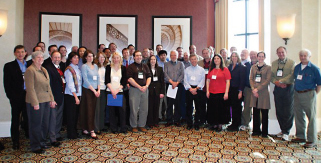
Attendees at the Baltimore long-range research planning workshop.
BARRIERS TO THE USE OF DECENTRALIZED SYSTEMS
In April 1997, the EPA published the “Response to Congress on Use of Decentralized Wastewater Treatment Systems” which addresses questions concerning the costs and benefits of onsite/decentralized wastewater treatment approaches. This document concluded that "adequately managed decentralized wastewater systems are a cost-effective and long-term option for meeting public health and water quality goals, particularly in less densely populated areas." However, a number of impediments, or "barriers", to more widespread use of onsite/decentralized systems are identified in this document, including:
- lack of knowledge and public misperception;
- absence of professional education programs and training opportunities focusing on decentralized systems;
- inconsistencies in enabling legislation;
- lack of accountability and program coordination among state agencies and local jurisdictions;
- regulatory constraints;
- absence of management programs; and
- liability issues and engineering fees.
The WERF project "Overcoming Barriers to Evaluation and Use of Decentralized Wastewater Technologies and Management" discusses these barriers to wider acceptance of decentralized systems in the engineering field, and proposes actions to overcome them. A web seminar was held to discuss the findings of the research in March 2007.

